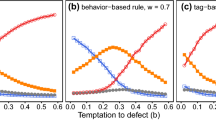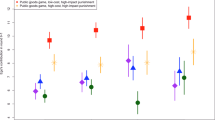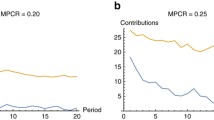Abstract
In many social dilemmas, individuals are each better off acting in their own best interest. Social norms provide a mechanism by which group level order can emerge. Often the enforcement of a social norm requires some altruistic punishment. In this paper I explore the role of social structure in the emergence of group level order, in a variation of n-person Prisoners Dilemma played out on a network. The results from this study show that clustering plays an important role in the formation of cohesive groups.
Preview
Unable to display preview. Download preview PDF.
Similar content being viewed by others
References
Axelrod, R.: An Evolutionary approach to Norms. Amer. Pol. Sci. Rev. 80(4), 1095–1111 (1986)
Dunbar, R.I.M.: Grooming Gossip, and the Evolution of Language. Harvard University Press (1996)
Dunbar, R.I.M.: The Social Brain: Mind, Language, and Society in Evolutionary Perspective. Ann. Rev. Anth. 32, 163–181 (2003)
Luce, R.D., Raiffa, H.: Games and Decisions: Introduction and Critical Survey. Dover, New York (1957)
Rapoport, A.: Two Person Game Theory. Dover, New York (1966)
Rapoport, A.: N-Person Game Theory: Concepts and Applications. Dover, New York (1970)
Hardin, G.: The Tragedy of the Commons. Science 162, 1243–1248 (1968)
Albert, R., Barabási, A.-L.: Statistical Mechanics of Complex Networks. Rev. Mod. Phys. 74, 47–97 (2002)
Watts, D.J., Strogatz, S.: Collective dynamics of “small-world” networks. Nature 393, 440–442 (1998)
Reader, S.M., Laland, K.N.: Animal Innovation. Oxford University Press, Oxford (2004)
Reader, S.M., Laland, K.N.: Social intelligence, innovation, and enhanced brain size in primates. Proc. Nat. Acad. Sci. 99(7), 4432–4441 (2002)
Author information
Authors and Affiliations
Editor information
Editors and Affiliations
Rights and permissions
Copyright information
© 2005 Springer-Verlag Berlin Heidelberg
About this paper
Cite this paper
Newth, D. (2005). Altruistic Punishment, Social Structure and the Enforcement of Social Norms. In: Khosla, R., Howlett, R.J., Jain, L.C. (eds) Knowledge-Based Intelligent Information and Engineering Systems. KES 2005. Lecture Notes in Computer Science(), vol 3683. Springer, Berlin, Heidelberg. https://doi.org/10.1007/11553939_114
Download citation
DOI: https://doi.org/10.1007/11553939_114
Publisher Name: Springer, Berlin, Heidelberg
Print ISBN: 978-3-540-28896-1
Online ISBN: 978-3-540-31990-0
eBook Packages: Computer ScienceComputer Science (R0)




